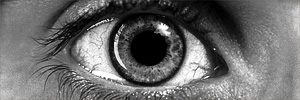
The Wrestler

THE WRESTLER (DVD)
Optimum Home Entertainment
Release date: 21st April 2009
Certificate (UK): 15
Running time: 104 minutes
Year of production: 2008
Director: Darren Aronofsky
Writer: Robert D. Siegel
Cast: Mickey Rourke, Marisa Tomei, Evan Rachel Wood
Sometime in my early primary school years, I had an argument with a classmate that lasted for almost an entire day. We debated whether professional wrestling was real or fake.
Prior to this, I had seen a professional wrestling match where one of the participants accidentally bit his tongue and it was bleeding pretty badly. He went on to finish the match occasionally sticking his bloody tongue out to wind up the audience. Having witnessed an actual, unintended injury, I was on the wrong side of this debate: at the age of ten, I was convinced that professional wrestling was real.
Later of course I came to see the truth, but couldn’t really blame myself for being mistaken before. For several decades, pro wrestlers never broke kayfabe (the fourth wall in the pro wrestling world) and the subject of an orchestrated storyline can be a tricky one to bring up even today with some wrestlers. It was brought into the public’s eye in 1984 with the notorious footage of journalist John Stossel being assaulted by wrestler David Schultz after Stossel stated that pro wrestling was ‘fake’.

As recently as 1999, documentary filmmaker Loius Theroux had a nasty run-in with a group of mainstream wrestlers after politely enquiring about the planning behind the scenes.
Darren Aronofsky’s The Wrestler feels like the last chapter in the slow process of professional wrestling ‘coming out of the closet’. It’s an uncompromisingly honest film about this secretive world told through the title character played by Mickey Rourke.
Aronofsky left no stone unturned and goes beyond the issue of predetermined outcomes; he deals with steroid use, the health problems that come with the craft and a wrestler becoming a social outcast in the new millennium as pro wrestling becoming somewhat obsolete.
Robin Ramzinski (Rourke) formerly known by his stage name Randy “The Ram” Robinson is struggling with a bleak everyday life and craves for the celebrity status he enjoyed in the 80s.

His former glory is only remembered by a few hard core wrestling fans while he is frequently mocked by his boss at the supermarket where he earns just enough money to pay the rent. Everything is a reminder that he’s no longer relevant: a neighbour’s kid reluctantly plays a video game with him that was released about 20 years back, but tells him of the latest popular first person shooter based on the Iraq war.
His friend Cassidy (Marisa Tomei), a stripper in the local strip club is just like Randy, getting too old for her job. Although they share the pain of being at the bottom of the world of glamour, Cassidy still has her dignity and feels sorry for Randy. The prospect of losing wrestling for Randy is not just losing a job: we, along with him, come to realise that he has nothing else left to live for.

The Wrestler’s story is an engaging and deeply moving one of a man who tries but fails to turn his life around. It’s taken to a painful climax as his desperation to travel back in time and escape from the reality of the 21st century grows.
Aronofsky’s decision to cast Mickey Rourke instead of Nicholas Cage was a financially risky, but courageous move. That decision fundamentally changed the shape of the movie: Aronofsky could not raise any money on Rourke to put together a decent budget, so The Wrestler turned into a documentary style film shot using handheld cameras with several improvised scenes where the crew would simply show up at places and start shooting.
This raw quality is matched by a beautifully unassuming score created by Clint Mansell who once again took the role of composer for Aronofsky. His soundtrack resonates emotionally within the film, underscoring Rourke’s overwhelming performance.
- Within the Ring (45.00)
- Interview with Mickey Rourke
- Theatrical trailer
While The Wrestler portrays what goes on behind the scenes in the world of pro wrestling, it is also respectful towards the craft. Besides the much-talked-about orchestrated storylines, the film shows – and makes this its central point – the very real pain and suffering of a dedicated wrestler.
The Wrestler leaves the question up for debate though: is Randy an artist with true devotion to pro wrestling, or is he more interested in the glamorous life style he once enjoyed? Similar to its companion piece Black Swan (2010), we are not sure what really motivates the film’s central character. Both Nina (Natalie Portman) and Randy crave for stardom and willing to work and sacrifice for that goal, but there is always a question mark hanging over their artistic sensibilities.

Arpad Lukacs
Arpad is a Film Studies graduate and passionate photographer (he picked up the camera and started taking stills just as he began his studies of moving pictures). He admires directors that can tell a story first of all in images. More or less inevitably, Brian De Palma has become Aprad’s favourite filmmaker.
Then there’s Arpad’s interest in anime. He was just a boy when he saw Nausicaä of the Valley of the Wind on an old VHS and was hypnotised by the story of friendship, devotion and sacrifice. He still marvels at the uncompromising and courageous storytelling in Japanese anime, and wonders about the western audience with its ever growing appetite for “Japanemation”.
Have a look at Arpad's photography site, and you can follow him on Twitter @arpadlukacs.
© 2012 STATIC MASS EMPORIUM . All Rights Reserved. Powered by METATEMPUS | creative.timeless.personal. | DISCLAIMER, TERMS & CONDITIONS
HOME | ABOUT | CONTACT | TWITTER | GOOGLE+ | FACEBOOK | TUMBLR | YOUTUBE | RSS FEED
CINEMA REVIEWS | BLU-RAY & DVD | THE EMPORIUM | DOCUMENTARIES | WORLD CINEMA | CULT MOVIES | INDIAN CINEMA | EARLY CINEMA
MOVIE CLASSICS | DECONSTRUCTING CINEMA | SOUNDTRACKS | INTERVIEWS | THE DIRECTOR’S CHAIR | JAPANESE CINEMA

 Please wait...
Please wait...




